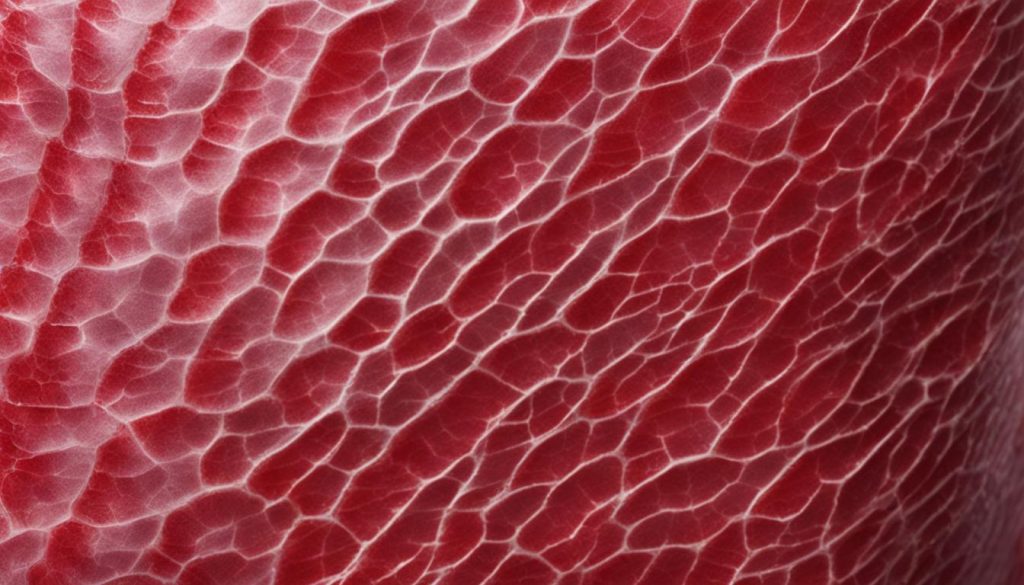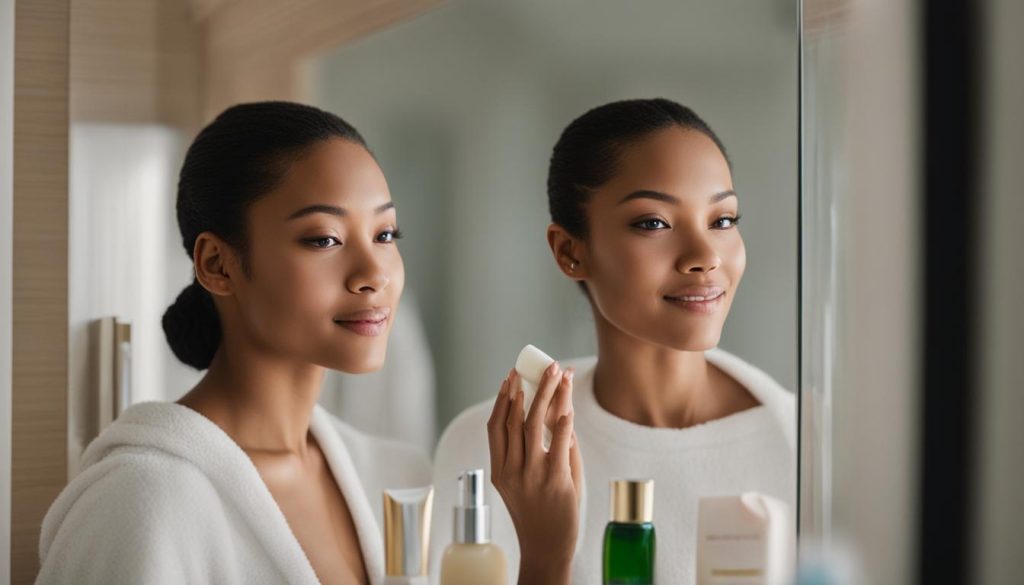As someone deeply invested in skin health, I understand that the key to a vibrant complexion begins with a robust skin barrier. Skin barrier repair is not just a trend; it’s an essential aspect of maintaining a healthy skin barrier. Knowledge on how to repair skin barrier effectively is vital, considering the many elements that can compromise it. In the quest for healthy skin, we often overlook the importance of repairing damaged skin barriers. Yet, this is the foundation that shields our body from external insults and seals in moisture.
Despite our best efforts, skin barrier optimization is an ongoing process. Whether you’re facing the effects of harsh climates or simply the wear and tear of daily life, improving skin barrier function can feel like a daunting task. But fear not, armed with the right information and tools, upholding a healthy skin barrier can be as intuitive as your morning cup of coffee.
Key Takeaways
- Understanding the fundamentals of skin barrier repair is key to long-term skin health.
- Identifying and combatting factors that lead to skin barrier damage is crucial.
- Adopting a tailored skincare regimen is central to maintaining a healthy skin barrier.
- Incorporating the right skincare ingredients plays a significant role in repairing a damaged skin barrier.
- Professional advice and selecting appropriate products support effective skin barrier optimization.
Understanding Your Skin Barrier and Its Critical Functions
As I delve deeper into what is skin barrier and its vital role, imagine your skin as a fortress. This fortress is what shields you from external threats and keeps valuable resources, like moisture, from escaping. The importance of skin barrier function cannot be overstated—it’s the frontline defense of your body’s largest organ.
Skin barrier function restoration is not just about beauty; it’s about health. I want to highlight that a robust skin barrier is essential for both protection and prevention. Whether your lifestyle involves braving the urban jungle or enjoying the tranquility of nature, taking steps to protect skin barrier integrity is a non-negotiable aspect of self-care.
Essential Components of the Skin Barrier
I’ve come to realize that the complexity of the skin barrier is akin to that of a finely constructed edifice. Its cellular matrix, made of corneocytes, binds together with a lipid mixture to form a protective layer that is both resilient and dynamic.
- Corneocytes: These dead skin cells are the bricks of our fortress wall, offering a physical barrier against harmful invaders.
- Lipid Matrix: Acting as the mortar, this includes cholesterol, fatty acids, and ceramides, which together create a waterproof seal that keeps essential moisture in and detrimental substances out.
The Role of the Acid Mantle in Skin Defense
Within this complex structure resides the acid mantle—an often overlooked hero in shielding the skin. My research has shown that a slightly acidic skin surface is not a flaw, but a sophisticated environment designed to suppress the colonization of harmful pathogens.
- Maintains Skin Acidity: The acid mantle ensures that the skin’s pH hovers around 5.5, which is essential for inhibiting unwanted bacterial growth.
- Protects Against Infections: A healthy acid mantle is a key to avoiding skin conditions and infections that can occur when the skin barrier’s balance is disrupted.
When we talk about skin barrier function restoration, we’re really referring to the resilience of our skin’s natural defenses, including the acid mantle. For those of us living with conditions that can affect skin acidity, like diabetes, the need to protect skin barrier integrity becomes even more pressing. Strategies to maintain and reinforce this barrier are integral not only to skin health but to our overall well-being.
Identifying Signs of Skin Barrier Damage
As someone passionate about dermatology and skin care, I’ve learned how crucial a healthy skin barrier is to our overall well-being. A compromised skin barrier can lead to numerous skin issues, severely impacting not only our appearance but also our skin’s ability to function properly. Recognizing the early warning signs of damage is essential for timely intervention.
Common Symptoms of a Compromised Skin Barrier
My experience with clients has taught me that the symptoms of a damaged skin barrier are often mistaken for general skin sensitivity or temporary blemishes. However, these are the tell-tale signs indicating an impaired skin barrier requiring immediate attention:
- Dryness or scaliness, pointing to a lack of moisture retention
- Itchiness, which can manifest as a constant, irritating sensation
- Acne that is persistent and seems resistant to conventional treatments
- Erythema or inflamed areas caused by an immune response
- Discoloration or uneven pigmentation of the skin’s surface
Environmental Factors Contributing to Skin Barrier Impairment
Our surroundings play a significant role in the integrity of our skin barrier. Knowing the external aggressors can aid in crafting a balanced routine with an aim to fix a compromised skin barrier. Here are the pervasive environmental culprits:
- Humidity fluctuations, which can overburden skin’s natural moisture balance
- Pollutants and free radicals causing oxidative stress
- Harmful UV rays leading to photo damage and premature aging
- Harsh skincare ingredients that strip the skin of its natural oils
Additionally, internal factors such as stress and genetics may predispose individuals to conditions like atopic dermatitis or psoriasis, making protection and repair of the damaged skin barrier all the more essential.

Essential Tips for Protecting Your Skin Barrier
Embarking on the journey to restore my skin barrier, I have realized the importance of incorporating both preventative and reparative measures. The utilization of barrier repair cream and facial creams for skin barrier repair is non-negotiable in my daily skincare regime. However, beyond these indispensable products, several other tactics come into play that ensure the robustness of my skin’s first line of defense.
Choosing the Right Cleansers and Moisturizers
It’s critical for me to choose cleansers that are gentle yet effective, so they cleanse without stripping my skin of its natural oils. When it comes to moisturizers, the key is finding formulations rich in ingredients known for moisturizers for skin barrier repair. Ceramides, hyaluronic acid, and glycerin are staples in my skincare arsenal. These ingredients support my skin’s natural barrier function, ensuring it remains resilient against external stressors.
The Importance of Product pH and Skin Harmony
I’m meticulous about the pH levels of the products I use, striving to maintain a balance that is in harmony with my skin’s natural state. Products that are too alkaline can be just as damaging as those that are overly acidic. It’s this delicate balance that helps to restore skin barrier integrity after it’s been compromised.
Effectively Implementing Sun Protection in Your Routine
No skin barrier discussion is complete without mentioning sun protection. Every day, I ensure to apply a broad-spectrum sunscreen. This not only prevents potential UV damage but also aids in the overall mission to maintain a healthy, intact skin barrier.
Strategies for Skin Barrier Repair
As someone who values the health of my skin, understanding how to restore my skin barrier is of utmost importance. Over time, I’ve learned that the skin’s resilience can be significantly enhanced with the right care. Here, I want to share personal strategies I’ve adopted to effectively heal and strengthen my skin barrier.
One of the first steps I took was incorporating plant oils into my skincare routine. Oils like jojoba and coconut are incredible for their moisturizing benefits. They mimic the skin’s natural oils and help in repairing and maintaining its moisture barrier.
- Jojoba oil is deeply hydrating and is known for its ability to quickly penetrate the skin.
- Coconut oil, with its rich fatty acid content, acts as an excellent emollient to soften the skin.
Moreover, including ceramide-rich formulations has been a game-changer for my skin’s structural integrity. Ceramides play a crucial role as they constitute a part of the skin’s barrier and contribute to moisture retention.
- Applied a ceramide-enriched moisturizer to tackle dryness and sensitivity.
- Ensured these moisturizers are part of my daily regimen, especially after showering when the skin is most receptive to hydration.
Occlusive moisturizers containing petrolatum have also been an MVP in my skincare arsenal. They create a protective layer over the skin, sealing in moisture and aiding the barrier to repair itself.
It’s important to highlight the effectiveness of humectants such as glycerin or hyaluronic acid, which attract water into the skin from the atmosphere, providing much-needed hydration for a damaged barrier.

Embracing these strategies has allowed me to see a marked improvement in my skin’s health. It feels more resilient, appears more radiant, and can better protect against environmental stressors. For those looking for ways how to heal the skin barrier, I recommend starting with these fundamental approaches to nurture and fortify your skin’s first line of defense.
Incorporating Barrier Repairing Ingredients Into Your Skincare
As someone deeply committed to maintaining the health of my skin, understanding the profound impact of barrier repairing ingredients has been a game-changer. In my daily regimen, I prioritize ingredients like ceramides, hyaluronic acid, and glycerin not only for their hydrating properties but also for their ability to fortify the skin’s natural defenses.
Ceramides, naturally occurring lipids in the skin, are critical in supporting the skin’s barrier and retaining moisture. Ensuring my skincare products are rich in ceramides helps me replenish these essential molecules, particularly as they deplete with age and environmental stressors.
- Ceramides for cellular level protection
- Hyaluronic acid to provide deep hydration
- Glycerin for its humectant qualities
Hyaluronic acid, a powerful humectant, has been my go-to for ultimate hydration. Its unique ability to hold up to 1000 times its weight in water aids in plumping the skin, easing fine lines, and providing an overall soothing effect.
Moreover, I’ve found that glycerin works impeccably in conjunction with other hydrating agents to draw in moisture and reinforce skin smoothness and elasticity, leading to visibly healthier skin.
Including these key actives in different formats—be it creams, serums, or masks—gives me the flexibility to address various aspects of skin health through targeted treatments. It’s a strategic approach to simultaneously combat dryness, sensitivity, and fortify my skin’s resilience against external stressors.
To optimal effect, I apply these powerhouse ingredients consistently and look for formulas that combine them synergistically. This practice, along with a balanced lifestyle, has left me with a more robust and responsive skin barrier that’s better equipped to face a range of conditions.
In closing, I encourage anyone aiming to enhance their skin’s fortitude to explore the wonders of barrier repairing ingredients. Their integration into your skincare regimen might just be the turning point for achieving a more radiant and sturdy skin barrier.
Professional Insights on Skincare Products for Barrier Restoration
As someone deeply committed to maintaining the integrity of my skin, I’ve come across a realm of expert-recommended skin barrier repair treatments that have profoundly influenced my skincare routine. Nurturing your skin’s barrier is fundamental to a radiant complexion, and it’s a quest I take seriously. This is why I turn to dermatologist-recommended skin barrier repair creams, which are crafted with an understanding of the skin’s delicate ecosystem.
In my journey, I have found that a tight-knit collaboration with skincare professionals has unveiled a treasure trove of moisturizing agents that work in concord to replenish and fortify the skin’s protective layer. Let me share some insights that could very well be your beacon to glowing, resilient skin.
Expert Perspectives on Moisturizing Agents
The consensus among skin care experts is unambiguous: hyaluronic acid, glycerin, and ceramides are the cornerstones of skin hydration and repair. These humectants and lipids are not just trendy buzzwords but the essentials that work beneath the skin’s surface, acting like a liquid patch to mend gaps and keep harmful irritants at bay.
Dermatologists’ Picks for Skin Repair Treatments
The lineup of stars in the arena of skin barrier repair includes some standout products that I’ve incorporated into my routine with significant success. Notables are Vichy Mineralizing Thermal Water for its mineral-rich formula, Vanicream Gentle Facial Cleanser for sensitive skin types, and Neutrogena Hydro Boost Body Gel Cream, which has been excellent for keeping my skin supple.
- When selecting a skin barrier repair treatment, considering a product’s pH compatibility with your skin is key
- Opt for creams infused with petrolatum and plant oils in evenings for an occlusive barrier to lock moisture in
- Scan ingredient lists for ceramides and glycerin, alert to their restorative and hydrating prowess
In summary, the pursuit of healthy, strong skin is a conscious endeavor that intertwines wisdom from dermatological experts with attentive personal care. Embracing dermatologist-recommended skin barrier repair creams and treatments rich in the right ingredients can lead to profound skin transformation that is both felt and seen. Thus, my commitment to expert-recommended skin barrier repair remains steadfast, paving the way to a vibrant skin barrier and inherent beauty that emanates from within.
Conclusion
In wrapping up this article, it’s clear that the journey to optimal skin barrier health is multifaceted. It’s been my personal experience that understanding how to repair the skin barrier isn’t just beneficial—it’s necessary for shielding our body’s vital moisture and offering protection against environmental threats. I’ve learned the importance of maintaining the skin barrier to ensure it stays strong and functions effectively, just as we maintain any other vital aspect of our health.
From the various insights and research findings presented, I now appreciate how the strategic choice of nourishing skincare products and a regimented skin routine play significant roles. It is evident that we must protect the skin barrier not only for a radiant complexion but also for our overall well-being. By embracing products enriched with barrier-repairing ingredients and by being cognizant of harmful external factors, anyone can begin the process of improving their skin’s resilience.
Finally, I hope that by conveying the substantiality of a well-maintained skin barrier, I have encouraged you to integrate these skin barrier optimization measures into your daily regimen. Remember, a healthy skin barrier is more than skin deep—it’s an investment in your body’s first line of defense and overall health.
FAQ
What constitutes a healthy skin barrier?
A healthy skin barrier is one which effectively protects against environmental stresses, pathogens, toxins, and prevents excessive moisture loss. It’s comprised of a strong layer of corneocytes, held together by a lipid matrix that includes ceramides, cholesterol, and fatty acids, as well as a slightly acidic acid mantle to deter unwanted microbes.
What are the signs of a damaged skin barrier?
Indications of a compromised skin barrier include persistent dryness, flakiness or scaliness, incessant itching, increased sensitivity, redness or inflammation, and in some cases, acne outbreaks or discoloration of the skin.
How can I repair my damaged skin barrier?
Repairing a damaged skin barrier involves a combination of simplifying your skincare regimen, using gentle cleansers and barrier-repair creams or lotions rich in ceramides, hyaluronic acid, and glycerin. It is also important to avoid harsh exfoliators, limit bathing time, apply moisturizer immediately after bathing, and give your skin time to naturally heal.
Which environmental factors can impair my skin barrier?
Numerous external elements can harm the skin barrier, including low humidity environments, high pollution levels, UV radiation, abrasive skin care ingredients, and rapid temperature changes. Internally, factors such as hormonal imbalances, stress, and certain genetic conditions can also lead to impairment.
How do I identify and select the right cleansers and moisturizers for my skin barrier?
When choosing skincare products, it’s beneficial to select those that match the skin’s natural pH, are fragrance-free, and contain gentle, moisturizing ingredients like glycerin, ceramides, and hyaluronic acid. Avoid products with harsh soaps, alcohol, or other skin-stripping components.
Can diet affect my skin barrier health?
Yes, a diet rich in antioxidants, healthy fats, and essential vitamins can help maintain and strengthen the skin barrier. Drinking enough water and reducing the intake of sugar and processed foods may also contribute positively to skin health.
What role do ceramides play in skin barrier repair?
Ceramides are critical in reinforcing the skin’s natural barrier, retaining moisture, and protecting against environmental threats. They help to ‘seal’ the barrier and prevent moisture loss, which is vital for healing and maintaining a robust skin barrier function.
Why is the pH level of skincare products important?
Skin’s natural pH hovers slightly acidic, and using skincare products that match or are close to this natural balance is crucial in preventing dryness, irritation, and barrier damage. Products with a pH that’s too high can strip away natural oils, whereas those too low can be overly aggressive.
What are the dermatologist-recommended treatments for skin barrier repair?
Dermatologists often recommend treatments that include barrier-repairing ingredients such as hyaluronic acid, glycerin, and ceramides. Products like Vichy Mineralizing Thermal Water, Vanicream Gentle Facial Cleanser, and Neutrogena Hydro Boost Body Gel Cream are befitting choices endorsed by skincare professionals.
How do I know if my skincare practices are harming my skin barrier?
If you notice increased sensitivity, dryness, or other signs of irritation after adopting new skincare practices, these could be indicators that your regimen is detrimental to your skin barrier. Reassess product choices, frequency of use, and how your skin reacts after application to tailor a more beneficial skincare regimen.






